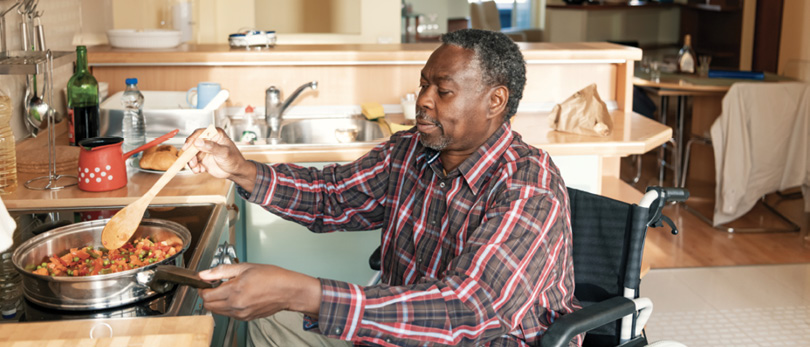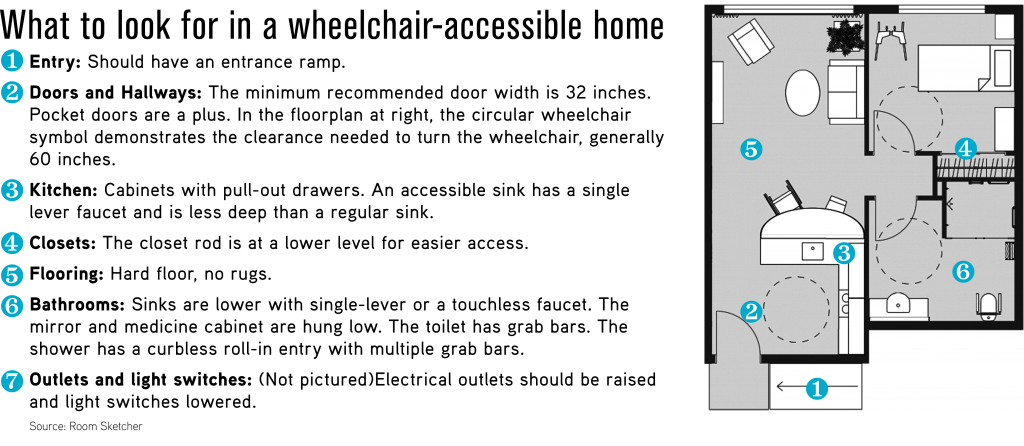CRSs can bring their usual high level of service to clients with special needs or disabilities
By Myrna Traylor
Being a REALTOR® means facing certain realities. Buyers usually come prepared with a list of must-haves that the agent must do their best to secure in a home at the right price point. Dealing with that list is only slightly different when the client has physical disabilities or other special needs. CRSs can bring their usual high level of client service to match this particular group of buyers with the right homes.
 The extra miles
The extra miles
“When dealing with someone who has special needs, you let them set the tone. They’ll tell you what they need,” advises Al Cannistra, CRS, of Texas Premier Realty in San Antonio. He has had several clients with special needs, most of whom have been referred by other clients. One such client was a woman who had been in a bad accident and was walking with the assistance of two canes. “I filled in for a REALTOR® friend of mine who became ill and couldn’t help this woman,” Cannistra says. Once he and the client were working together, it was time to start visiting properties. When the client explained that she couldn’t drive, Cannistra offered to pick her up—a drive that was more than 30 miles each way. “We’d go to two or three houses; she couldn’t do more than that,” he says. “And then I would take her home. And at the end of the week, she bought a house.”
Researching the right questions
Going the extra (30) miles is nothing out of the ordinary for CRSs. Nicki Conway, CRS, of Fine Properties in Sarasota, Florida, says that her experience working with special needs clients has taught her to ask a lot of questions. “The moment my client told me she had a handicap, I started asking questions. ‘How wide is your chair? Do you have a portable chair for touring homes? Do you want to go in my car or follow me in yours? Will your husband or a caretaker be with you? Tell me what I need to look out for while finding your next home,’ and so on.”
Diana Galavis, CRS, of Watson Realty Corp. in Jacksonville, Florida, says she doesn’t do special marketing to the disabled community. She, too, acquires clients through referrals and her own community activities. “I research resources such as schools, therapy centers or other programs,” she says, to prepare herself for whatever her clients might need. “Understanding, kindness and attention to detail allow the customer to feel empowered and comfortable throughout the transaction.”
Accessibility needs
Of course, finding a home with the right accommodations can prove to be a challenge. People who use wheelchairs will be looking for accessibility in everything from thresholds to the width of doorways to hard flooring. In addition, lower counter heights in the kitchen and no-lip showers in the bathroom will make maneuvering safe and easy. The best feature set might be found in customizable new construction.
Cannistra worked with a client who was relocating to Texas. They worked with a national homebuilder who tweaked certain features at no cost, like widening the pantry entrance and making sure windows could be operated from his wheelchair. “When he relocated again—to Florida—he convinced me to get a real estate license in Florida so I could help him there,” reports Cannistra. “He liked working with that builder so much he bought his Florida home from them, too.”
“Keep in mind there may be things about any home that need to be changed for your client,” Conway adds, “so you may need to provide vendors who can help make the home perfect. Make sure you get the home at a good price to allow for these changes.”
“When working with customers with special needs or accommodations, it is important to be receptive,” Galavis says. “Be aware of sensitivities, but treat them as you would treat any other customer.”
Conway agrees. “Treat your client with respect, and ask a lot of questions. Don’t give any indication you feel sorry for them. Your client is excited about finding a new home. Your goal is to find the right home.”
Selling a Home with Accessible Features
When it comes time to put a home with special features on the market, Diana Galavis says that every transaction is unique. “For instance, if a bathroom was modified with a standing tub, and the potential buyer would like a bathroom without the accommodation, the buyer may want to negotiate the conversion. They may want to have it remodeled back to the original bathroom or ask for concessions to have it done after the sale is complete,” she explains. “If the accommodation is necessary for the owner of the property while they are in residence, then a conversion prior to sale may not be an option. The key is to identify these potential objections, discuss them with the seller and suggest optional solutions upfront.”
For more information on working with clients with disabilities, visit
nar.realtor/on-common-ground/people-with-disabilities-are-not-innately-vulnerable.
Photo: iStock.com/RealPeopleGroup









